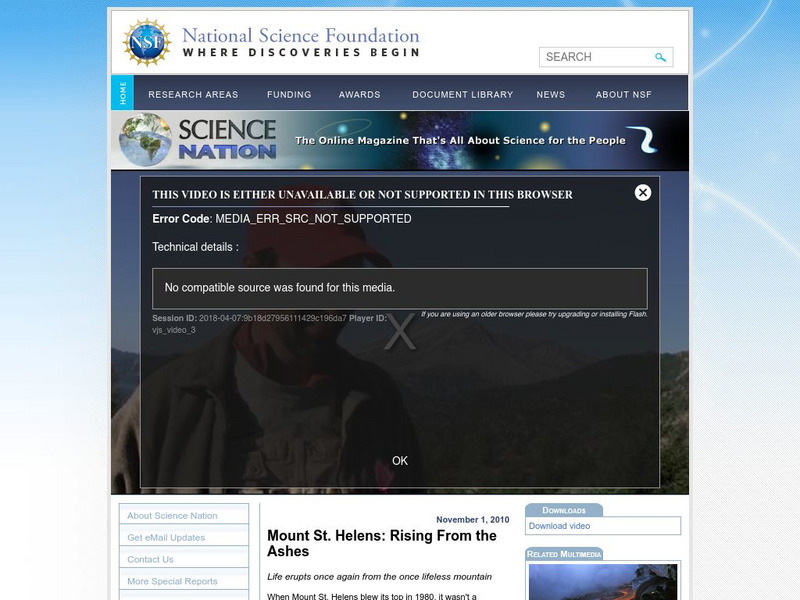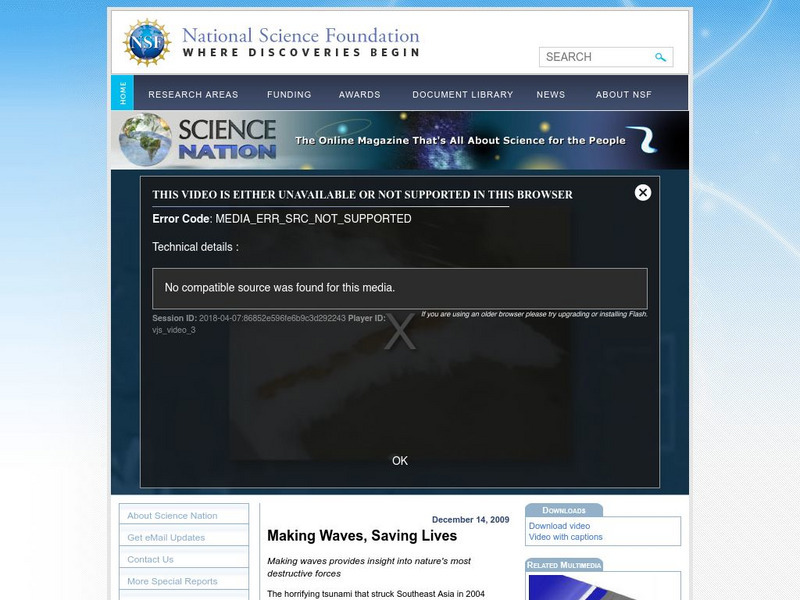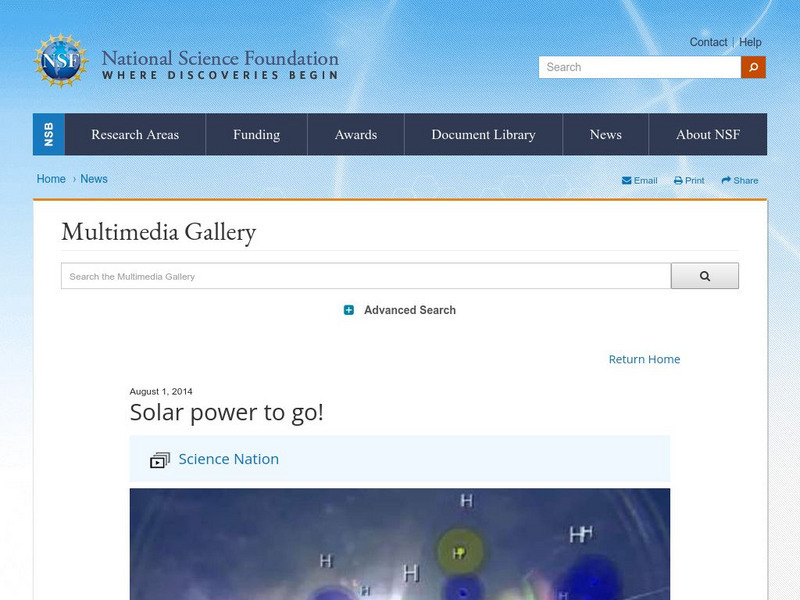Hi, what do you want to do?
National Science Foundation
Science of NFL Football: Vectors
Map the velocity of a thrown football using physics! Learners study vector addition using a football scenario. Two vectors model the movement of the receiver and quarterback while the resulting vector describes the velocity of the...
National Science Foundation
Science of NFL Football: Kinematics
Describe the motion of a football running back using physics kinematics. The seventh lesson in a series of 10 video lessons describes the velocity, acceleration, and position of key plays on the football field. Individuals learn the...
National Science Foundation
Science of NFL Football: Newton's First Law of Motion
Why are some football players harder to tackle than others? Turns out physics is the answer. The fifth lesson of the 10-part video series continues connecting the NFL to physics concepts. Young scientists learn about inertia through an...
National Science Foundation
Science of NFL Football: Newton's Second Law of Motion
Newton would have been a great football coach. A 10-part video series examines several physics topics through a football lens. Using Newton's Second Law of Motion, individuals learn how force applies to kicking a football.
National Science Foundation
Science of NFL Football: Newton's Third Law of Motion
A football tackle is just a transfer of momentum, Learners discover the principles of Newton's Third Law by analyzing football tackling. The third lesson in a series of 10 videos shows how the mass and velocity of a defensive player lead...
National Science Foundation
Science of NFL Football: Pythagorean Theorem
Physics can make football players better. A creative video shows learners how to apply the Pythagorean Theorem to defensive situations. The first of a 10-part video series calculates the distance a defender needs to cover using right...
National Science Foundation
Science of NFL Football: Geometric Shapes
Ever wonder why a football has such an unsual shape? Find out with this video from the Science of Football colelction that examines how the geometric properties of a football make it perfectly suited for being thrown accurately over...
National Science Foundation
Science of the Winter Olympic Games: Olympic Movement and Robotic Design
Here is a high-interest topic to inspire your engineering class: robots that can learn. These particular machines imitate the motion of athletes headed for the Olympic Winter Games. Hear from a professor of dynamics, systems, and control...
National Science Foundation
Science of the Winter Olympic Games: Engineering Faster and Safer Bobsleds
While your physical science class is studying mechanics, this would be a fabulous enrichment video for covering aerodynamics or friction. Mechanical engineers dedicate their time to developing Olympic-quality bobsleds to be as fast, but...
National Science Foundation
National Science Foundation: Sea Turtles
A video clip from a university lab of sea turtles and the research being done to prove their apparent instinct to use the Earth's magnetic fields to follow their routes of migration. A brief overview of their life cycle is included....
National Science Foundation
National Science Foundation: Mount St. Helens: Rising From the Ashes
A video investigating the destruction the eruption of Mount St. Helens caused. See how the life is being revived on this once lifeless mountain. [2:28]
National Science Foundation
National Science Foundation: Making Waves, Saving Lives
The devastating 2004 Southeast Asia tsunami provided researchers with previous non-existent valuable data and video as to the workings of a tsunami. As well, a discussion is presented of how a tsunami would affect the west coast of...
National Science Foundation
National Science Foundation: Science of Innovation: Biometrics
Describes a technique for reading patterns of veins in the white of an eye in order to identify a person. [5:19]
National Science Foundation
National Science Foundation: When Nature Strikes: The Science of Natural Hazards: Flash Floods
Learn what conditions contribute to the occurrence of flash floods, and what scientists are doing to improve our ability to forecast these events. [5:23]
National Science Foundation
National Science Foundation: Solar Power to Go
A fascinating look at research into developing solar-powered fuels that are renewable, can be stored, and could one day be used to power vehicles. [3:11]
National Science Foundation
National Science Foundation: Profiles of Scientists and Engineers
A collection of videos that profile the work and lives of scientists and engineers.
National Science Foundation
National Science Foundation: Science Behind the News
A collection of videos highlighting science news. Covers a diverse range of topics such as crowdsourcing, bio-inspired materials, and vaccines.
National Science Foundation
National Science Foundation: Science of Innovation
A collection of videos that highlight major innovations in the sciences, such as biofuels, self-driving cars, and 3-D printing. The series was compiled in honor of Thomas Edison's 165th birthday anniversary.
National Science Foundation
National Science Foundation: Science in Motion
A collection of short videos highlighting interesting research being done in science and engineering.
National Science Foundation
National Science Foundation: Science of Nhl Hockey
A collection of ten videos that examine the physics behind NHL hockey. They cover topics such as Newton's Laws of Motion, projectile motion, and kinematics.
National Science Foundation
National Science Foundation: Science of Speed
A collection of videos that examine the physics concepts at play in NASCAR racing. They cover topics such as friction, tires, aerodynamics, balance, and the fire suits worn by drivers.
National Science Foundation
National Science Foundation: Green Revolution
Videos on different forms of alternative energy and various green initiatives, e.g., green roofs.
National Science Foundation
National Science Foundation: Fabricating Fabric: Nylon
Video explaining how nylon, the world's first synthetic cloth, came to be invented, and the chemistry of how it is made. Its importance in the Second World War is also described. [6:47]
National Science Foundation
National Science Foundation: Chemistry of Green: Chlorophyll
Video explaining how chlorophyll makes plants appear to be green to human eyes. [5:35]





















